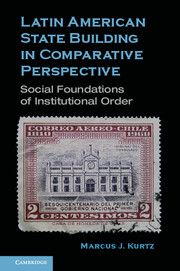Book contents
- Frontmatter
- Contents
- Acknowledgments
- 1 The Difficulties of Studying State Building
- 2 The Social Foundations of State Building in the Contemporary Era
- 3 State Formation in Chile and Peru
- 4 State Formation in Argentina and Uruguay
- 5 Divergence Reinforced
- 6 The Social Question and the State
- 7 Conclusions, Implications, and Extensions
- References
- Index
- References
7 - Conclusions, Implications, and Extensions
Social Foundations, Germany–Prussia, and the Limits of Contemporary State Building
Published online by Cambridge University Press: 05 February 2013
- Frontmatter
- Contents
- Acknowledgments
- 1 The Difficulties of Studying State Building
- 2 The Social Foundations of State Building in the Contemporary Era
- 3 State Formation in Chile and Peru
- 4 State Formation in Argentina and Uruguay
- 5 Divergence Reinforced
- 6 The Social Question and the State
- 7 Conclusions, Implications, and Extensions
- References
- Index
- References
Summary
This book has laid out a long-term, path-dependent explanation for state-building outcomes in the South American region. The explanation has also taken issue with the theoretical thrust of much of the contemporary literature; its emphasis has been squarely societal and political–economic. Instead of war, the curse of resource wealth, institutional design, leadership, or culture holding pride of place in explaining long-run patterns of political development, the emphasis here has been on underlying social and political dynamics at two key moments – the initial formation of national political institutions in the wake of independence from Spain and the period in which the middle and working classes first gained substantial suffrage and effective entry into national political competition.
Recapitulation
The approach taken in this book differed sharply from prevailing approaches to the study of state building. It proposed a path-dependent theory of the development of national political institutions that posited two critical inflection points. The first, which comes at the time of the consolidation of national political institutions in the postcolonial era, depends fundamentally on (1) the servile or juridically free character of prevailing social relations and (2) the ability or inability of elite political factions to cooperate around the formation of national institutions that would work to their collective – and individual – benefit. These two features of the postindependence sociopolitical environment condition the resultant trajectories, for unless both conditions are met (juridically free labor and elite political cooperation), the construction of comprehensive and penetrating state institutions will be unlikely.
Information
- Type
- Chapter
- Information
- Latin American State Building in Comparative PerspectiveSocial Foundations of Institutional Order, pp. 227 - 250Publisher: Cambridge University PressPrint publication year: 2013
